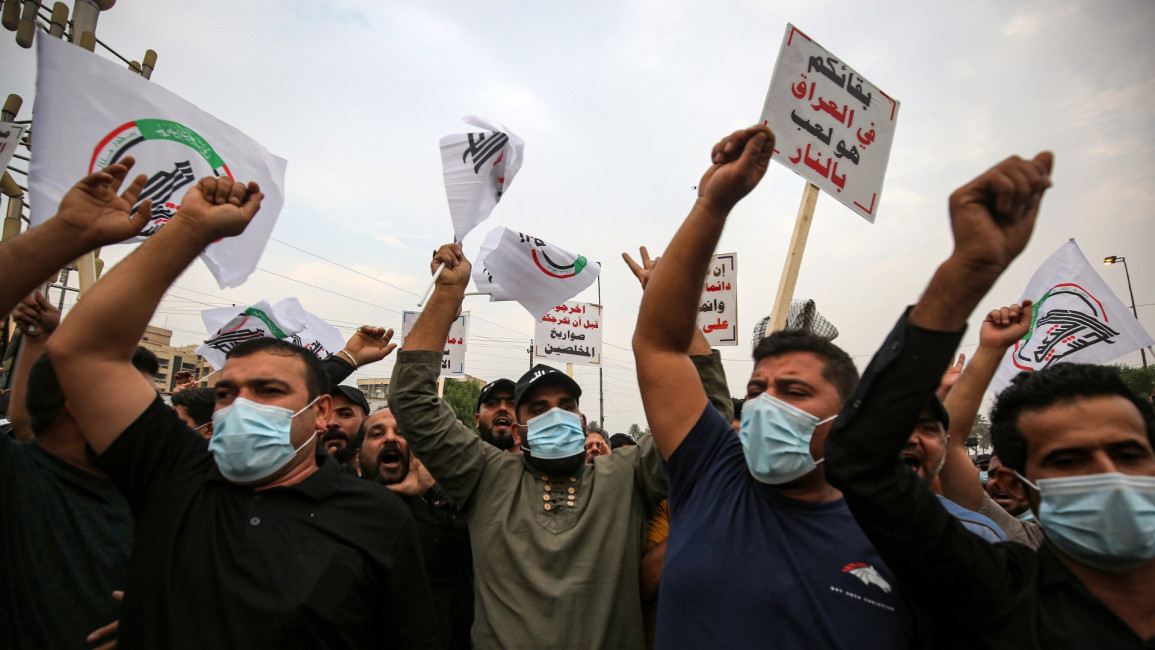Iraq 'shrine factions' look to peel away from Hashed
Around the corner from Iraq's holiest shrines, a years-long struggle over allegiances and resources is coming to a head - threatening a dangerous schism within a powerful state-sponsored security force.
The growing fissure pits the vast Iran-aligned wing of the Hashed al-Shaabi network against four factions linked to the shrines of Iraq's twin holy cities, Karbala and Najaf.
Those factions, dubbed "the Shrine Hashed" and comprising around 20,000 active fighters, held their first strategic planning meeting earlier this month.
Throughout the packed three days, spokesmen for the shrine groups leaned on two sources of legitimacy: a patriotic, "Iraq-only" discourse, and the blessing of the "marjaiyah," Iraq's Shiite spiritual leadership.
"The Shrine Hashed are the origin of the broader Hashed," Hazem Sakhr, a spokesman for the four factions, told AFP.
"We are committed to Iraqi law and the marjaiyah's orders."
Maytham al-Zaidi, the prominent commander of the largest shrine group known as the Abbas Combat Division, struck a nationalistic, reformist tone.
"The main reasons for establishing the Shrine Hashed is to serve our country, and to correct both its track record and trajectory," he said.
Ali al-Hamdani, who heads the 3,000-member Ali al-Akbar Brigade, said the meeting -- held in Najaf and Karbala -- was "exclusively" for the Shrine Hashed, setting their future apart from the rest.
Hamdi Malik, a London-based expert on Shiite factions, said the shrine groups were now publicly insisting on a separation.
"They are escalating with this new conference, and want to accelerate that process," Malik told AFP.
Three fault lines
The Hashed al-Shaabi network was formed in 2014 when Iraq's top Shiite cleric, Grand Ayatollah Ali Sistani, issued an edict urging citizens to fight the advancing Sunni extremists of the Islamic State group.
His call brought together already-existing paramilitary factions and new formations, including the Shrine Hashed.
But internal disputes emerged as early as 2016, with Malik pointing to three main fault lines.
Shrine factions began complaining that they were being starved of resources by Abu Mahdi al-Muhandis, the umbrella group's deputy head.
Muhandis died in a US strike in January this year that also killed his friend, top Iranian general, Qasem Soleimani.
The Shrine Hashed had accused Muhandis of prioritising factions closer to Tehran in the distribution of military equipment and state-allocated salaries.
|
Malik said the tug-of-war was linked to a second, more profound split: a "real ideological divide" over ties to neighbouring Iran, which had long provided support to armed groups in Iraq.
Those factions are even dubbed "the loyalist Hashed" for their perceived allegiance to Tehran over Baghdad.
At the meeting, spokesmen were careful not to specifically criticise Iran but repeatedly rejected what they characterised as external meddling.
"Foreign intervention is dangerous. The Shrine Hashed rejects all shapes and sizes it may come in," Sakhr said.
The 90-year-old Sistani, known to be wary of Iran's influence, has not commented publicly on the meeting -- but it would not have gone ahead without his tacit approval, said Malik.
"It's important for Sistani, while he is alive and capable, that he puts his house in order," said Sajad Jiyad, a fellow at US think tank The Century Foundation.
'End of the Hashed'
Thirdly, shrine-linked groups have looked disdainfully at the Hashed's dabbling in politics.
"Sistani had given clear instructions that no Hashed member should participate in politics. But pro-Iran factions in the Hashed created the Fatah alliance and took part in the 2018 parliamentary elections," Malik said.
Fatah won the second-largest number of seats and wields significant influence in both parliament and several government ministries.
With new elections set to be held in June 2021, shrine factions have said they will stick to Sistani's orders.
"Our members are free to participate as voters but not as candidates," said Mushtaq Abbas Maan, the media head for Karbala's Abbas shrine, which sponsors the factions.
While The Century Foundation's Jiyad said he doubted armed conflict would erupt between the two wings, he said a divorce would likely be messy.
The Shrine Hashed still lack a legal or administrative framework to govern their forces outside the broader network's by-laws, and government decrees linking them to the prime minister's office have been slow to take hold.
At the conference, Maan appealed to the premier, who is Iraq's commander-in-chief, to "urgently" bring shrine factions under his wing, thereby finalising their split from the wider network.
But shrine factions also fear that if they peel away, "loyalist" groups could monopolise the Hashed's budget, fighting force and political influence, Malik said.
Their moves have already irked the Iran-linked Hashed, whose commanders declined AFP's requests for comment.
But the sharp-tongued Qais al-Khazali, who heads a powerful Hashed faction known as Asaib Ahl al-Haq, told state media last month that a secession by shrine groups could prompt other wings to strike out on their own, too.
"The Hashed will be divided into three. That means the end of the Hashed," he warned.


![Minnesota Tim Walz is working to court Muslim voters. [Getty]](/sites/default/files/styles/image_684x385/public/2169747529.jpeg?h=a5f2f23a&itok=b63Wif2V)




![Debris near Rafic Hariri International Airport [Getty]](/sites/default/files/styles/image_330x185/public/2176162423.jpeg?h=a5f2f23a&itok=MCSK9mkM)
![An Israeli air strike on Jabalia killed teenage journalist Hassan Hamad [Screengrab/X]](/sites/default/files/styles/image_330x185/public/2024-10/hassan%20hamad1.jpg?h=c12e0b96&itok=Rd_dyCVp)
